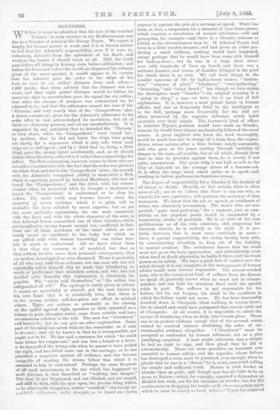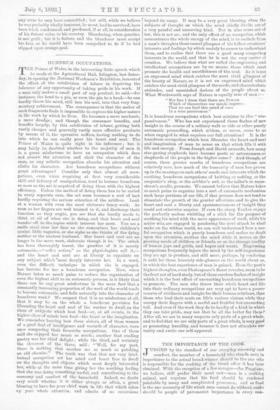BLUNDERS.
WE fear it must be admitted that the loss of the ironclad 'Victoria' in calm weather in the Mediterranean was due to a blunder of Admiral Sir George Tryon. We regret it deeply, for human nature is weak, and it is in human nature to feel that the Admiral's responsibility, even if it were in- voluntary, detracts from the splendour of his death, and weakens the lesson it should teach us all. Still, the truth goes before all things in history, even before edification ; and unless the facts now before the world are disproved by evidence given at the court-martial, it would appear to be certain that the Admiral gave the order to the ships of his fleet • to turn at six cables' distance from each other,- 1,200 yards ; that when advised that the distance was too short, and that eight cables' distance would be better, he assented ; that he nevertheless gave the signal for six cables ; that when his change of purpose was commented on, he adhered to it ; and that this adherence caused the loss of the Victoria,' and very nearly that of the Oamperdown ' also. A dozen reasons are given for the Admiral's adherence to his order after he had acknowledged its unwisdom, but all of them are obviously guesses, and all are unsatisfactory. It is suggested by one authority that he intended the Victoria' to turn short, while the Camperdown ' went round her ; by another, that he did not know the ships were going too elowly for a manceuvre which is only safe when such ships are at full speed; and by a third that he, being a little blind, gave the wrong signal accidentally, and, as we Elhould deduce from the story, adhered to it rather than acknowledge his defect. The first explanation, however, seems to those who are not sailors inconsistent with the fact that the order was given to the whole fleet, and not to the Camperdown ' alone; the second, with the Admiral's recognised ability to manceuvre a fleet, which is especially pressed by Admiral Markham, who was on board the Camperdown;' and the third, with his remon- strance when he perceived what he thought a slackness on board the Camperdown ' to understand or to obey his orders. The exact truth may become known when the quantity of sworn evidence which it is plain will be available has been collated by naval experts ; but as yet the most probable explanation, the one most consistent with the facts and with the whole character of the man, is that Admiral Tryon committed one of those blunders which are inexplicable by any known mental law,—suffered, in fact, from one of those accidents of the mind which as cer- tainly occur as accidents to the body, but which no one gifted only with human knowledge can either fore- tell, or avert, or understand. All we know about them is that they are common to all mankind, but that as they seldom involve more than personal consequences, they are seldom investigated or even discussed. There is probably, of all who may read these columns, not one man who has not repeatedly asked himself why he made that blundering re- mark, or performed that mistaken action, and who has not decided quite honestly that explanation is absolutely im- possible. The "words said themselves," or " the action was independent of will." The apology is rarely given to others, it seems so untruthful or absurd; yet the man knows in his own heart that it is absolutely true, that there is in the excuse neither self-deception nor effort to mislead others. There are actions as automatic as the closing of the eyelid against light, speeches as little intended as a scream in pain, thoughts which come from outside and have no conacious relation to the will. The man has "blundered" and knows it ; but he can give no other explanation. Some part of his mind has acted without the remainder, as it acts in dreams ; and all he knows is that he is irresponsible, yet ought not to be. He has said a sentence for which "he could have bitten his tongue out," and has lost a friend or a lover; or he has pulled the wrong rein when he meant to have pulled the right, and has killed some one in the carriage; or he has admitted a suspicion against all evidence, and has become incapable of reading the drama before him which it is essential to him to understand. Perhaps the most frequent of all such occurrences, or the one which has happened to most persons, is that described as "walking into danger." The man is not frightened, and not blinded, and not stupid, and till he does, with his eyes open, the precise thing which, as he afterwards recognises, makes " accident " absolutely un- avoith,Lio -)nd severe; walks straight, as we heard one victim express it, against the pole of a carriage at speed. There has been, in fact, a suspension for a moment of true brain-power, which requires a correlation of several attributes—will and perception, for example—and there is a blunder, hideous or trivial, as the circumstances may be. If Admiral Tryon had been in a little wooden steamer, and had given an order pro- ducing a small collision, nothing would have happened, except perhaps that he would have been cross with himself for half-an-hour ; but he was in a huge steel struc- ture with hundreds of lives on board, and there was a national disaster, and scores of families plunged in the grief for which there is no cure. We call such things in the smaller concerns of life by half-a-dozen names, "inatten- tion," "absence of mind," "blindness," "wool-gathering," "dreaming," and "being dazed ; " but though we have stolen the descriptive word "blunder "—its original meaning is a "going to sleep," a nap—we have for it no kind of full explanation. It is, however, a most potent factor in human affairs, and one as frequently fatal to the intelligent as to the dull, perhaps more frequently, for the dull are often protected by the superior influence which habit exercises over their minds. The boatswain kind of officer in Admiral Tryon's position would have made no blunder, because he would have almost mechanically followed the usual course. A great engineer who knew the work thoroughly, would be much less safe in charge of a train than the engine- driver, whose actions after a time become nearly automatic, and who goes on for years rushing through varieties of danger to his train, all terrible, but of all which, though from time to time he provides against them, he is nearly, if not quite, unconscious. The great whip is not half as safe in the City at high-tide as the average driver of a hansom-cab. It is often. the large mind which splits, so to speak, and, working in halves, performs its functions wrong.
The degree of responsibility for a blunder is the hardest of all things to decide. Morally, we feel certain, there is often none at all ; nor do we believe that there is any one who, as regards his own experience, will question the accuracy of that statement. We know that the act or speech, or avoidance of either, was absolutely involuntary. The man's wits are sus- pended, "gone wool-gathering" for a moment, just as com- pletely as his physical power would be suspended by a momentary stroke of paralysis. He is as sure of his own guiltlessness as of his . own existence, and, supposing his sureness sincere, he is entirely in the right. It is pro- bable, however, that in most cases—certainly in some— there is partial responsibility, the victim having been able, by concentrating attention, to keep out of the liability to mental accident. The switchman knows that his mind must not go as the train approaches; and consequently, even when tired to death physically, he holds it there, and the train passes on in safety. We have a good deal of control over the mind, though it is not complete, or the management of human affairs would soon become impossible. The absent-minded man, who is the commonest kind of sufferer from the disease we speak of, generally knows when he must not be absent- minded, and can hold his attention fixed until the special crisis is past. The sufferer is not responsible for his failure, but for not keeping his mind in the condition in which the failure could not occur. He has been innocently knocked down in Oheapside when walking in reverie there ; but he should and could have postponed that reverie until out of Cheapside. At all events, it is impossible to admit the excuse of blundering when on duty, into human pleas. There can be no perfect evidence except that of the accused, which cannot be received without abolishing the rules of cir- cumstantial evidence altogether. "I blundered" must be accepted as confession by human tribunals, not as a plea justifying acquittal. A man might otherwise sign a cheque he had no right to sign, and then plead that he did it automatically. There are some penalties on innocent acts essential to human safety; and the signaller whose failure has destroyed a train must be punished, even though, when he pleads that he was in a " dwam," he is, to his own mind, telling the simple and sufficient truth. Nature is even harder on blunder than on guilt; and though man has no right to be as stern as Nature—which, for example, executed a dynamiter at Madrid last week, not for his intention to murder, but for his carelessness in dropping his bomb—still, there are points upon which he must be nearly as hard, Admiral Tryon has expiated any error he may have committed ; but still, while we believe he was probably wholly innocent, he must, had he survived, have been tried, condemned, and pardoned, if at all, in consideration of his future value to his country. Blundering, when genuine, is not guilt ; but it is failure, and the blunderer must accept his fate, as he would have been compelled to do if he had slipped upon orange-peel.



































 Previous page
Previous page